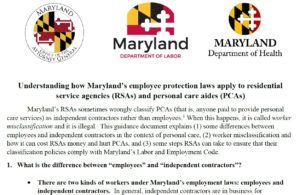What to Know When Hiring 1099 Caregivers
If you are hiring a caregiver for you or a loved one, you need to know about 1099s. A 1099 is a tax form used to report payments made to contractors and other independent workers for services performed. As a caregiver employer, you must use this form to report payments you make to caregivers.
The Difference Between Hiring 1099 Caregivers or An Agency
When hiring a 1099 caregiver instead of a home care agency, it’s important to know the difference between an independent contractor and employee. An independent contractor is someone who is paid on a contractual basis and is not considered an employee under the law; they
typically have more control over their own work and do not receive benefits like health insurance or paid time off. On the other hand, an employee is someone who is employed by a company and receives benefits like health insurance, paid time off, and unemployment insurance. You should also know that in Maryland, the Department of Labor and Attorney General say that engaging caregiver and classifying them as a 1099 independent contractor is a misclassification and “illegal.” Click here for more information.
What are My Responsibilities When Hiring 1099 Caregivers?
If you are hiring a caregiver as an independent contractor, you will need to provide them with a 1099 tax form at the end of the year. This form reports all payments that the caregiver received from you during the tax year. It’s important to note that caregivers must receive a 1099 if they were paid more than $600 during the tax year.
When providing a 1099 to a caregiver, you must also obtain a W-9 form from the caregiver. This form is used to collect the caregiver’s tax information, including their name, address, and Social Security number. This information is used to generate the 1099 form.
It’s important to note that when hiring a 1099 caregiver, you are responsible for withholding taxes from their paycheck. You must also pay your share of payroll taxes, such as Social Security and Medicare taxes. Lastly, it’s important to remember that you must issue a 1099 to any caregiver who was paid more than $600 during the tax year.
What to Do?
Hiring a caregiver can be a complicated process, and understanding the tax implications is key to staying compliant. It’s important to understand the difference between an independent contractor and an employee, as well as when and how to provide a 1099 form. By following these guidelines, you can ensure that you are properly reporting payments made to caregivers and staying up to date on all of your tax obligations.
If you do not want to follow all of the guidelines for hiring 1099 caregivers, you can always hire a reputable home care agency that employs its caregivers. In these cases, the agencies comply with all the employment and labor laws so you can focus on keeping your loved one safe and independent at home. In addition, these agencies perform background screenings, help with scheduling, and provide fill-in caregivers if your normal caregiver is unavailable. HomeCentris always employs its caregivers so you can rest assured your caregivers are compliant with laws and regulations. If you looking for an employed caregiver, or, if you are a 1099 contractor caregiver that wants to join a compliant agency, give HomeCentris a call.


